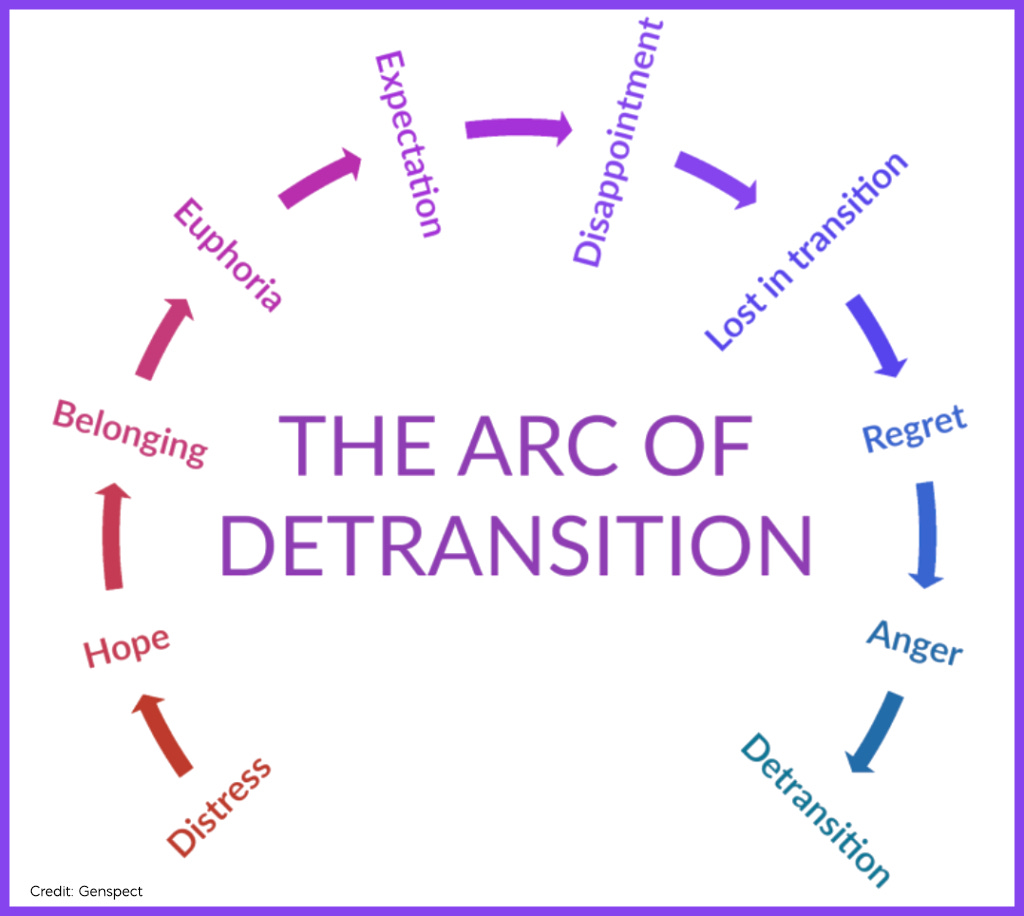Three Ethical Questions About “Gender-Affirming Care”: Detrans Awareness Part 2
Yes or No to Puberty Blockers, Hormones, and Surgeries?
Hi friends, and welcome, new subscribers!
I usually stay in my sports lane. I’ll dive back into those familiar waters next week.
But just as a swimmer ventures beyond the pool to learn about such things as nutrition, a writer ventures beyond her subject area to broaden her understanding — and her performance.
Over the past three years, while investigating this odd, tautological question – Who should qualify as female athlete? – I’ve educated myself about biology1; differences of sexual development2; testosterone suppression3; sexual assault rates in coed locker rooms; and much more.
I’ve grown concerned about — even alarmed by — so-called gender-affirming care. I’ve wondered: How could it possibly be ethical to respond to children’s proclamations that they are transgender by removing their healthy body parts? And sterilizing them? And damaging or destroying their sexual function?
Last week, I profiled detransitioner Chloe Cole at Genspect’s Detrans Awareness Day in Washington, D.C.
This week, I’ll share three questions designed to help people decide whether children should receive medical interventions based on their gender identity. This framework was designed by Danish filmmaker and teacher
, who shared them on Gender: A Wider Lens, the groundbreaking podcast by and . O’Malley is the founder of Genspect, which advocates for “a non-medicalized approach to gender.”Believe it or not, plastic surgeons now reshape “non-binary” humans to appear non-human. More like Barbie and Ken dolls.
Here are Rasmussen’s questions (paraphrased), interspersed with my own reporting:
1) Is there one hundred percent certainty that all children diagnosed with gender dysphoria would, if medically untreated, continue to feel the same intense discomfort their entire lives?
No. Between eighty and eighty-eight percent of children outgrow their gender dysphoria without medical interventions. “Only very few trans kids still want to transition by the time they are adults,” says clinical psychologist
.This alone would be sufficient to answer “no.” I’ll offer more food for thought:
Most Gender Dysphoric Kids Grow Up to Be Gay
Gender-dysphoric kids “generally turn out to be regular gay or lesbian folks,” says Cantor. In one study of boys with early-onset gender dysphoria who received “watchful waiting” treatment rather than medical interventions, 64 percent grew up to be gay or bisexual. A majority of lesbians and gay men report that they were gender-nonconforming children, as was I.
The LGB Alliance, a British organization devoted to gay rights, says gender-affirming care amounts to no more than “’transing the gay away’ when we should be helping young people to understand and accept their sexuality and grow up to live happy, healthy lives as lesbians, gay men or bisexuals.” About 80 percent of trans-identified kids experienced bullying prior to adopting the trans identity. No wonder they’re attracted to a popular new way to define themselves.
Detransitioners
Detransitioners provide additional proof that gender dysphoria can be transitory. We don’t have good detransition and regret data, but we know that 76 percent of detransitioners do not inform their physicians that they have stopped treatment.
This number gives us a sense of scale: There are 57,000 members of Reddit’s Detransition Subreddit (adults and children). Last week, there were 56,000.
“We have thousands of reports now of people who say, ‘This was the most harrowing, devastating experience of my life and I'm really crippled by it,’” says O’Malley, who leads a weekly support group for those harmed by medical transition.
2) Given that there is not one hundred percent certainty of a lifelong diagnosis, is it ethical to knowingly subject some children to permanent physical damage and dysfunction so that other children can receive treatment?
No. Other factors to consider:
Gender Dysphoria Is a Medical Scandal Without Scientific Rationale
Stop the Harm found that between 2019 and 2023:
62,682 sex-change prescriptions were written for minors
8,579 minors received hormones and puberty blockers
5,747 minors had sex-change surgeries
Hospitals charged insurance companies more than $119 million for these services.
Gender dysphoria surgeries increased 500 percent in the United States between 2016 and 2021. Yet the extensive Cass Review uncovered no justification for any of these procedures. No medications used to treat gender dysphoria, including puberty blockers and cross-sex hormones, have been FDA-approved for use in minors for this mental-health disorder.
Complications and side effects include infertility, sexual dysfunction, heart attack, stroke, osteoporosis, blood clots, vaginal atrophy, cognitive decline, urinary dysfunction, bowel dysfunction, chronic pain, and more.
Puberty blockers, marketed as “time to think,” lead to cross-sex hormones about 98 percent of the time. When puberty is blocked, natural maturation of the body fails to occur. Puberty blockers “turn a child into something we’ve never had on this planet: Somebody who is one sex and getting the hormones of the other sex and never went through puberty,” notes James Linehan on this harrowing Beyond Gender podcast.
Care to guess the earliest age at which puberty blockers have been prescribed by, for example, The Children’s Hospital of Philadelphia’s Gender & Sexuality Development Program? Ten years old.
Kids with trans identities are four times more likely than the general population to have coexisting mental disorders. Between 35 and 48 percent are autistic.
Surgery does not fix such problems. A Swedish study showed that people who received what used to be called sex-reassignment surgery have a 19 percent higher suicide risk than matched controls.
Even social transitions are ill advised, according to the Cass Review. Referring to a girl as “he,” “they,” or “George” can be dangerous because it can confuse kids about what their sex actually is, and can lead to medical procedures.
A Particular Risk to Girls
Girls comprise between 70 and 83 percent of trans-identified teens - an enormous recent surge seemingly related to a documented teen-girl phenomenon: joining destructive social trends, including anorexia and cutting. “Chest masculinization” is the most common “gender affirming” surgery today.
New Option for “Fabulous People”: Nulloplasty
Body-modification experiments are growing increasingly extreme — and are marketed to teens. QueerDoc offers “telemedicine-based gender-affirming medical care” for adolescents and adults with this welcome: “Are you queer? Trans? Nonbinary? SO ARE WE!!!” One happy customer received a prescription within two hours. Just what teens want: instant fixes.
Here’s something that might shock you: Nulloplasty is “one of the newer bottom-surgery options available for gender diverse, expansive, and fabulous people,” QueerDoc says. Founded by Dr. Crystal Beal (they/themme), QueerDoc defines nulloplasty as “the removal of internal and external genital structures to create a smooth appearance from the abdomen to the groin.”
In other words, plastic surgeons now design “non-binary” humans to appear non-human. More like Barbie and Ken dolls.
The Crane Center calls these “Genital nullification, Nullo, or Eunuch” procedures. “Your specific goals can be discussed with one of our surgeons to develop a plan that works for you.”
ART Surgical elaborates, “For those born with female genitalia,” mix-and-match nullification options include “hysterectomy, vaginectomy, vulvectomy, clitorectomy...”
Wait: “clitorectomy” now too? As in female genital mutilation (FGM)? Yes. FGM and “gender-affirming care” are both inflicted on children - primarily girls - below the age of consent. One is widely considered a human rights violation; the other is promoted as a human right.


3) Should we continue to perform “gender affirmation” operations on children?
By now you know my answer, and
’s: No.Children do not need to “express their authentic selves” through cosmetic and chemical procedures that have zero proven benefits and countless risks.
“Gender-affirming care” for youth has been restricted or abolished in the United Kingdom, Finland, Norway, Denmark, and Sweden, and 26 U.S. states. It was banned in the U.S. by Protecting Children from Chemical and Surgical Mutilation, which has been partially blocked by a federal court.
But if not medication and surgery, then what should we offer gender-distressed kids?
Permission to be effeminate, tomboyish, same-sex-attracted, gender-nonconforming, whatever.
Information: Humans and other mammals do not change sexes.
Love.
Selected Stronger Women stories below; see also #SaveWomensSports
There are only two sexes.
Differences of sexual development are genetic mutations that do not, despite rampant misinformation, constitute additional sexes.
No amount of testosterone suppression eliminates male performance advantage.






Excellent overview. Thank you.
Me too: "I’ve grown concerned about — even alarmed by — so-called gender-affirming care. I’ve wondered: How could it possibly be ethical to respond to children’s proclamations that they are transgender by removing their healthy body parts? And sterilizing them? And damaging or destroying their sexual function?"
I'm not on the sidelines. My daughter went all in and is now unrecognizable in every dimension. It has been devastating to me, her mom, and our whole family. I now write in hopes of changing the culture that created a perfect storm in my family that we may never recover from. I hope your writing, mine and that of many others will prevent other families and other children from succumbing to irreversible alterations to their bodies that they may regret in the decades to come. Thank you again.
This is a really concise packaging of all the relevant data with some I hadn't heard before. The rational tone and fact-centered approach makes it a good one to pass along to non GC people not yet informed.